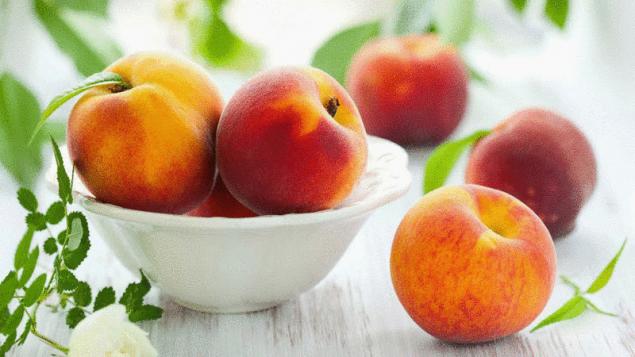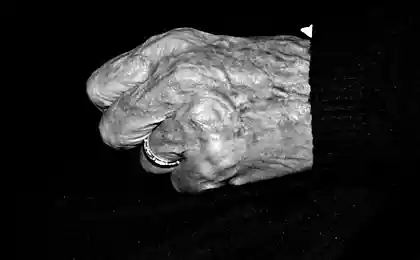403
Peach — fountain of youth
Peaches come in a wide variety of sizes and shapes and, most importantly, they are incredibly tasty and healthy. These juicy, slightly tart fruits also have excellent flavor. Today we will talk about the qualities of peaches, which make them an indispensable element of a healthy diet. Did you used the peaches to slow down aging and, like potatoes, contain nicotinic acid?

Remember that nutrition is very individual. Some people can have allergic reactions even to the most wholesome foods therefore to develop a diet it is best under the guidance of an experienced dietitian.
What and why is helpful peaches?The energy value of peaches is only 39 calories per 100 grams. They do not contain saturated fat, but have lots of nutrients, vitamins and minerals.
Increased antioxidant ORAC peach is 1814 TE per 100 grams of product.
Vitamins and antioxidants. Fresh peaches are a source of antioxidants and vitamin C in moderate amounts. Vitamin C has antioxidant effect and is essential for the synthesis of connective tissues in the body. Eating foods rich in vitamin C helps the body in resistance to infection, allowing it also to be cleansed from harmful free radicals.
Fresh fruits are also sources of vitamin A and ß-carotene is a provitamin which is converted in the body into vitamin A. vitamin a is essential for vision. It is also required to maintain healthy skin and mucous membranes. Eating vitamin A-rich fruits offers some protection against lung cancer and oral cavity.
Peaches contain healthy antioxidants, flavonoids and polyphenols, including lutein, zeaxanthin and beta-cryptoxanthin. These substances act as protective scavengers oxygen binding of free radicals and reactive oxygen species (ROS) that influence aging and various disease processes.
Minerals. Peaches are rich in many essential minerals, including potassium, fluoride and iron. Iron plays an important role in the formation of red blood cells. Fluorine is necessary for bones and teeth, preventing tooth decay. Potassium helps to regulate heart rate and blood pressure.
Well, now it's time exact figures for those who got used to accurately estimate the amount of nutrients in your plate. It should be noted that these figures are not absolute, because the peaches are different from each other. The content of elements and their recommended daily consumption of the given resource Nutrition-And-You with reference to the recommendations of the Ministry of agriculture of the United States.
100 grams of peaches contain...In parentheses are the percentage of the recommended daily allowance of consumption of these nutrients.
In total: energy value — 39 calories (2%); carbohydrates — 9.54 grams (7%); protein 0.91 grams (1,5%); fat 0.25 grams (1%); cholesterol — 0 milligrams (0%); fiber included into food — 1.5 grams (4%).
Vitamins: folate — 4 micrograms (1%); nicotinic acid — AZN 0.806 milligram (5%); Pantothenic acid — 0,153 mg (3%); vitamin B6 (pyridoxine) — 0.025 milligrams (2%); vitamin B2 (Riboflavin) — 0.031 milligrams (2,5%); vitamin B1 (thiamine) — 0,024 mg (2%); vitamin A — 326 international units (IU, IU) (11%); vitamin C — 6.6 mg (11%); vitamin E 0.73 milligrams (5%); vitamin K and 3.6 micrograms (2%).
Electrolytes: sodium — 0 milligrams (0%); potassium 190 mg (4%).
Minerals: calcium — 6 mg (0.6 percent); copper — 0,068 mg (7,5%); iron — 0.25 milligram (3%); magnesium — 9 mg (2%); manganese — 0.61 milligram (3%) phosphorus 11 mg (2%); zinc — 0.17 milligram (1.5 percent).
Phytonutrients: beta-carotene (provitamin A) — 162 micrograms;; beta-cryptoxanthin (orange-yellow pigment) was 67 micrograms; lutein-zeaxanthin — 91 micrograms.
Is it important for you nutrient elements in the food or you prefer to eat what you like, not calculating calories and not counting vitamins? Whether fruits in the menu of fast food?
Source: hi-news.ru

Remember that nutrition is very individual. Some people can have allergic reactions even to the most wholesome foods therefore to develop a diet it is best under the guidance of an experienced dietitian.
What and why is helpful peaches?The energy value of peaches is only 39 calories per 100 grams. They do not contain saturated fat, but have lots of nutrients, vitamins and minerals.
Increased antioxidant ORAC peach is 1814 TE per 100 grams of product.
Vitamins and antioxidants. Fresh peaches are a source of antioxidants and vitamin C in moderate amounts. Vitamin C has antioxidant effect and is essential for the synthesis of connective tissues in the body. Eating foods rich in vitamin C helps the body in resistance to infection, allowing it also to be cleansed from harmful free radicals.
Fresh fruits are also sources of vitamin A and ß-carotene is a provitamin which is converted in the body into vitamin A. vitamin a is essential for vision. It is also required to maintain healthy skin and mucous membranes. Eating vitamin A-rich fruits offers some protection against lung cancer and oral cavity.
Peaches contain healthy antioxidants, flavonoids and polyphenols, including lutein, zeaxanthin and beta-cryptoxanthin. These substances act as protective scavengers oxygen binding of free radicals and reactive oxygen species (ROS) that influence aging and various disease processes.
Minerals. Peaches are rich in many essential minerals, including potassium, fluoride and iron. Iron plays an important role in the formation of red blood cells. Fluorine is necessary for bones and teeth, preventing tooth decay. Potassium helps to regulate heart rate and blood pressure.
Well, now it's time exact figures for those who got used to accurately estimate the amount of nutrients in your plate. It should be noted that these figures are not absolute, because the peaches are different from each other. The content of elements and their recommended daily consumption of the given resource Nutrition-And-You with reference to the recommendations of the Ministry of agriculture of the United States.
100 grams of peaches contain...In parentheses are the percentage of the recommended daily allowance of consumption of these nutrients.
In total: energy value — 39 calories (2%); carbohydrates — 9.54 grams (7%); protein 0.91 grams (1,5%); fat 0.25 grams (1%); cholesterol — 0 milligrams (0%); fiber included into food — 1.5 grams (4%).
Vitamins: folate — 4 micrograms (1%); nicotinic acid — AZN 0.806 milligram (5%); Pantothenic acid — 0,153 mg (3%); vitamin B6 (pyridoxine) — 0.025 milligrams (2%); vitamin B2 (Riboflavin) — 0.031 milligrams (2,5%); vitamin B1 (thiamine) — 0,024 mg (2%); vitamin A — 326 international units (IU, IU) (11%); vitamin C — 6.6 mg (11%); vitamin E 0.73 milligrams (5%); vitamin K and 3.6 micrograms (2%).
Electrolytes: sodium — 0 milligrams (0%); potassium 190 mg (4%).
Minerals: calcium — 6 mg (0.6 percent); copper — 0,068 mg (7,5%); iron — 0.25 milligram (3%); magnesium — 9 mg (2%); manganese — 0.61 milligram (3%) phosphorus 11 mg (2%); zinc — 0.17 milligram (1.5 percent).
Phytonutrients: beta-carotene (provitamin A) — 162 micrograms;; beta-cryptoxanthin (orange-yellow pigment) was 67 micrograms; lutein-zeaxanthin — 91 micrograms.
Is it important for you nutrient elements in the food or you prefer to eat what you like, not calculating calories and not counting vitamins? Whether fruits in the menu of fast food?
Source: hi-news.ru
Kazakhstan is a country of mountains, steppes and wild romance
Owl camouflage – an example of natural camouflage suit
























